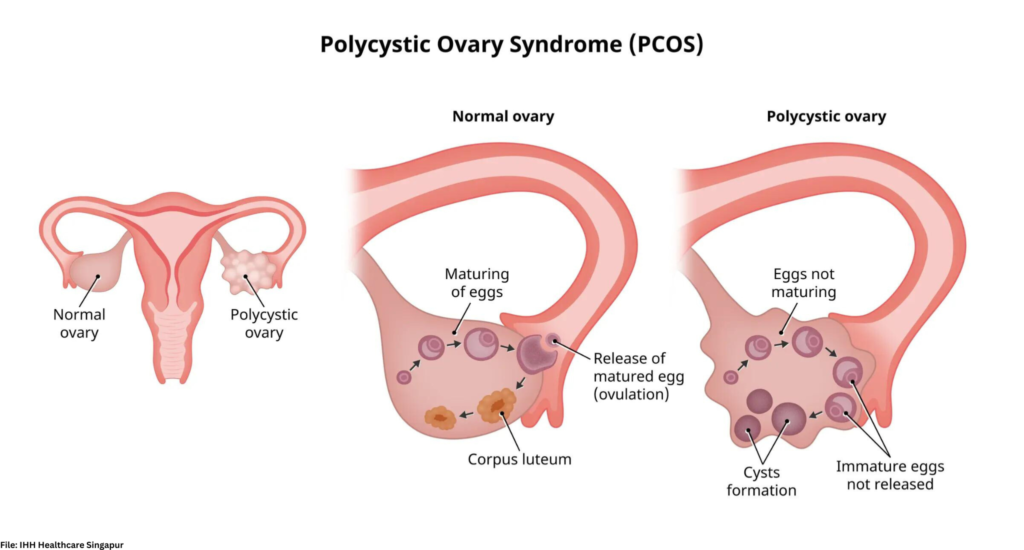What is polycystic ovarian syndrome (PCOS)?
Polycystic ovarian syndrome (PCOS) is a hormonal issue that affects women during their reproductive years. The ovaries produce an abnormal amount of androgens (male sex hormones). This hormonal imbalance leads to irregular menstrual cycles, missed periods, and unpredictable ovulation.
Polycystic ovary syndrome refers to the formation of numerous cysts in the ovaries. These cysts develop along the outer edge of the ovary and contain immature follicles that fail to release eggs regularly. A small follicular cyst may appear on the ovaries due to a lack of ovulation, which can be detected by ultrasound. PCOS doesn’t necessarily require cysts on the ovaries, despite its name.

Who gets PCOS?
PCOS affects 5% to 10% of women aged 15–44, with most recognizing it in their 20s and 30s. It can occur at any age after puberty and affects women of all races and ethnicities. The risk may be higher if obesity is present or if a family member has a history of PCOS.
What causes PCOS?
The cause is unknown, but experts believe it is influenced by
- Genetics
- High levels of androgens
- Insulin resistance
What are the sign’s of PCOS?
- Irregular menstrual cycle: Abnormal menstruation is characterized by missing or non-existent periods and may also involve heavy bleeding during these periods.
- Abnormal hair growth: Excess facial hair, heavy hair growth on arms, chest and abdomen
- Acne or oily skin: Acne on the face, chest, and upper back
- Darkening of skin: Along neck creases, underneath breasts and in the groin
- Obesity: Weight gain, especially around the belly
- Ovarian Cysts: Many people with PCOS exhibit larger or numerous follicles on ultrasound, which are egg sac cysts.
- Skin Tags: Flaps of skin on the neck or armpits
- Hair thinning: Hair loss in patches or male-pattern baldness
- Infertility: Irregular or infrequent ovulation can lead to inability to conceive
Is it possible to get pregnant with PCOS?
Yes, PCOS is a common but treatable cause of infertility in women. It interferes with ovulation, the growth and release of eggs from the ovaries. If you don’t ovulate, you can’t get pregnant. Doctors can help you improve ovulation and increase your chances of pregnancy.
How is PCOS diagnosed?
PCOS diagnosis is not based on a single test, but a doctor may discuss medical history, perform a physical exam, and perform various tests to rule out other causes.
- Physical exam: Accesses your health by measuring your blood pressure, BMI, waist size, and skin (for extra hair, acne, discoloration, hair loss) or signs of other health conditions like an enlarged thyroid gland.
- Pelvic exam: Used to detect extra male hormones, such as an enlarged clitoris, and to evaluate whether ovaries are enlarged or swollen.
- Pelvic ultrasound: Is used to examine the ovaries for cysts and the endometrium (the lining of the uterus or womb).
- Blood tests: Are conducted to assess androgen hormone levels, which are also checked for other hormone-related problems like thyroid disease, cholesterol levels, and diabetes and can be mistaken for PCOS.
The three symptoms to diagnose PCOS are:
Healthcare providers typically diagnose PCOS if at least two of the three symptoms are present.
- Irregular or missed periods.
- Signs of excessive androgen or a blood test confirming high androgen levels.
- Enlarged or polycystic appearance of ovaries on ultrasound But many people don’t develop cysts.
How is PCOS treated?
Your healthcare provider will determine your treatment based on your symptoms, medical history, other health conditions, and whether you want to get pregnant. Treatments can involve medication, lifestyle modifications, or a combination of both.
Treatments for non-pregnant individuals include:
- Hormonal birth control: Hormonal birth control, including pills, patches, shots, vaginal rings, and IUDs, regulates menstrual cycles, improves acne, and helps with excess hair growth.
- Metformin: By enhancing the insulin process, we can treat diabetes with the help of metformin, which improves menstrual cycles in some individuals with PCOS.
- Anti-androgen medicines: They inhibit androgynous effects and alleviate scalp hair loss along with facial and body hair growth and acne.
Treatment options for PCOS if you want to get pregnant:
- Losing weight: Losing weight through healthy eating and regular physical activity can improve fertility and regularize the menstrual cycle in individuals who are overweight or obese.
- Medicine: Successful PCOS pregnancy involves ovulation, induced through oral medications like clomiphene and letrozole, and gonadotropin injections.
- In vitro fertilization (IVF): is a treatment option if traditional medicine fails. It involves fertilizing an egg with a partner’s sperm in a laboratory, then implanting it in the uterus. IVF has higher pregnancy rates and better control over twins and triplets compared to medicine alone.
- Surgery: A surgical procedure restores ovulation by removing androgen hormone-producing tissue in the ovaries, but surgeons rarely perform this procedure due to newer medications.


